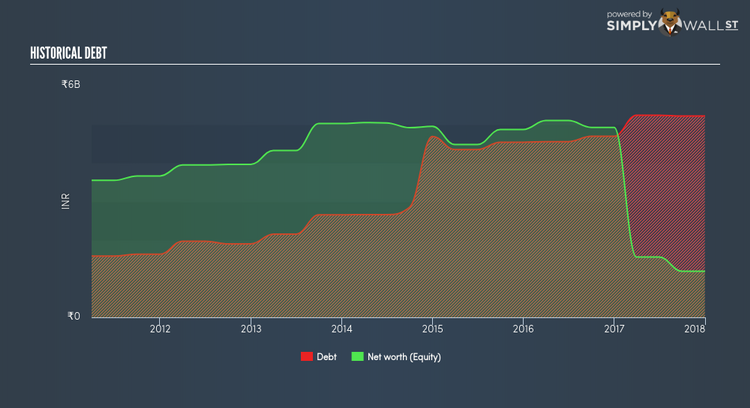Is DQ Entertainment (International) Limited’s (NSE:DQE) Balance Sheet A Threat To Its Future?

While small-cap stocks, such as DQ Entertainment (International) Limited (NSEI:DQE) with its market cap of ₹1.03B, are popular for their explosive growth, investors should also be aware of their balance sheet to judge whether the company can survive a downturn. Since DQE is loss-making right now, it’s crucial to evaluate the current state of its operations and pathway to profitability. Here are few basic financial health checks you should consider before taking the plunge. Nevertheless, given that I have not delve into the company-specifics, I’d encourage you to dig deeper yourself into DQE here.
Does DQE generate an acceptable amount of cash through operations?
DQE has built up its total debt levels in the last twelve months, from ₹4.55B to ₹5.24B , which comprises of short- and long-term debt. With this rise in debt, DQE currently has ₹213.45M remaining in cash and short-term investments , ready to deploy into the business. Moreover, DQE has generated cash from operations of ₹339.47M in the last twelve months, resulting in an operating cash to total debt ratio of 6.48%, meaning that DQE’s debt is not appropriately covered by operating cash. This ratio can also be interpreted as a measure of efficiency for unprofitable companies as traditional metrics such as return on asset (ROA) requires a positive net income. In DQE’s case, it is able to generate 0.065x cash from its debt capital.
Can DQE pay its short-term liabilities?
At the current liabilities level of ₹3.04B liabilities, the company is not able to meet these obligations given the level of current assets of ₹1.20B, with a current ratio of 0.39x below the prudent level of 3x.
Is DQE’s debt level acceptable?
DQE is a highly-leveraged company with debt exceeding equity by over 100%. This is not uncommon for a small-cap company given that debt tends to be lower-cost and at times, more accessible. But since DQE is currently loss-making, sustainability of its current state of operations becomes a concern. Maintaining a high level of debt, while revenues are still below costs, can be dangerous as liquidity tends to dry up in unexpected downturns.
Next Steps:
DQE’s high debt level indicates room for improvement. Furthermore, its cash flow coverage of less than a quarter of debt means that operating efficiency could also be an issue. In addition to this, its low liquidity raises concerns over whether current asset management practices are properly implemented for the small-cap. Keep in mind I haven’t considered other factors such as how DQE has been performing in the past. I recommend you continue to research DQ Entertainment (International) to get a more holistic view of the stock by looking at:
1. Valuation: What is DQE worth today? Is the stock undervalued, even when its growth outlook is factored into its intrinsic value? The intrinsic value infographic in our free research report helps visualize whether DQE is currently mispriced by the market.
2. Historical Performance: What has DQE’s returns been like over the past? Go into more detail in the past track record analysis and take a look at the free visual representations of our analysis for more clarity.
3. Other High-Performing Stocks: Are there other stocks that provide better prospects with proven track records? Explore our free list of these great stocks here.
To help readers see pass the short term volatility of the financial market, we aim to bring you a long-term focused research analysis purely driven by fundamental data. Note that our analysis does not factor in the latest price sensitive company announcements.
The author is an independent contributor and at the time of publication had no position in the stocks mentioned.


